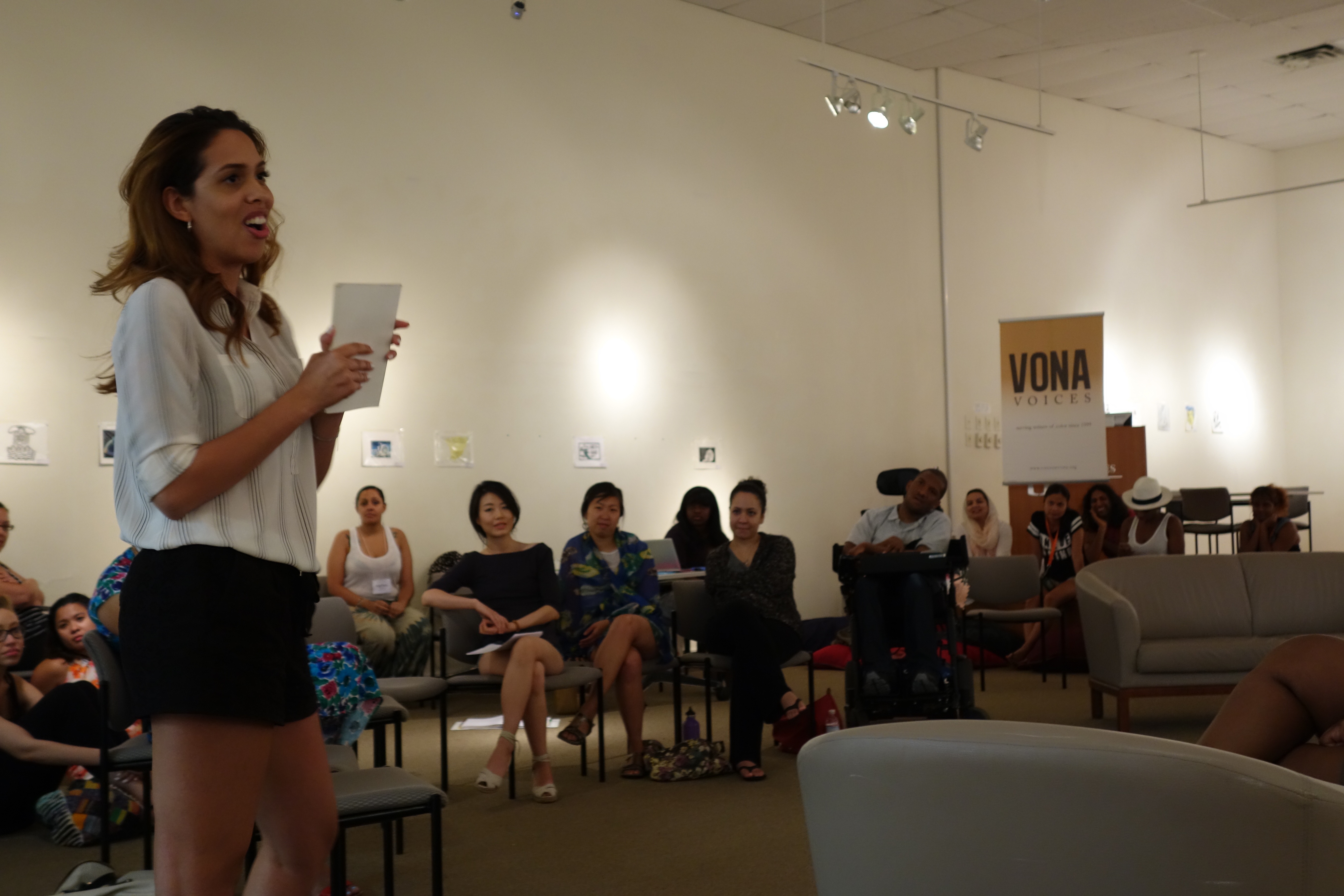
Voices of Our Nation Arts Foundation moves its safe space for writers of color to South Florida

Photo: A VONA student addresses her classmates during a Voices workshop in Miami.
After 15 years of operating exclusively in the Bay Area, the Voices of our Nations Arts Foundation will bring its multi-genre workshop for writers of color to South Florida this summer. The workshop aims to provide an inclusive experience for aspiring minority authors.
“The city has a wonderful tradition of art. It’s incredibly diverse, and emblematic of the nation we are speaking to,” said Junot Díaz, one of VONA’s founders. “We received generous support from the University of Miami, and that is not a small thing. The embrace has been very warm.”
Through M. Evelina Galang, a University of Miami creative writing professor and VONA board member, the foundation secured a home for its mission to provide a safe space for writers of color to develop their ideas and for workshops in fiction, poetry, memoir, political content, LGBTQ narrative and playwriting.
“It is hard to express the importance of artists of color to our understanding of the world,” Díaz said. “It is just impossible to overestimate how fundamental the contributions of artists of color are to our humanity.”
The foundation brings together a staff of successful artists of color from around the nation to teach ambitious writers of color how to make their voices heard in an oppressive environment.
“A lot of the students lose the defensiveness they have built up when they are in a white space,” said Staceyann Chin, a poet and one of the professors at VONA. “We begin by saying the center of the narrative is not whiteness; the center of the narrative is wherever you begin … Here you are less defensive of that identity, so it opens up the space for you to write an authentic truth that may be even more universal than when you tried to shield yourself from the gaze of whiteness.”
While a casual observer may believe authorship has been moving toward equality, this year’s New York Times summer reading list did not feature a single work written by an author of color, according to VONA’s founders. This oversight only hints at the underlying issues artists of color face every day they choose to create, they said.
“When my first book came out, people would say, ‘It’s so nice to have a book about Arabs that aren’t terrorists,’” said Elmaz Abinader, one of the founders of VONA. “That’s the kind of atmosphere we are living in, and it’s only getting narrower.”
Despite a successful career as an author, Díaz echoes these thoughts. For every popular writer of color like him or Abinader, countless others struggle in a system ignoring their existence, he said.
“As a nation, our inability to recognize the overwhelming unfair advantage we give to whiteness is problematic on so many levels,” Díaz said. “The nature about artists, I would say, is that they are closer to being the kind of people who confront these kinds of hegemonies. Artists are often pulling the veil from the world, saying what is not normally said, being truthful when we have been raised by lying … I certainly think it’s almost impossible for a someone, especially a young person, living in this country right now not to feel like the status quo is political and f—– up.”
VONA seeks to help solve these concerns by providing a safe haven for minority voices to develop into informed perspectives. These additional, diverse views will lead to a more holistic representation in the arts and media, according to Chin.
“I was a young lesbian, a young immigrant, a young black woman, a young person who did not quite fit in,” Chin said. “I think having a place that affirmed who you are, and said nothing is wrong with who you are … If I had that space, something like VONA, I would have been less scared, less alone. I would have made better connections … This can only help to create a better canon, a more inclusive canon, a canon that reflects humanity rather than one stroke of the human brush.”
In addition to the two weeks of intensive workshops, the VONA staff will hold two reading events featuring the professional staff. The first will occur Thursday, June 25, at Coral Gables Congregational Church. The next readings will take place on July 2 at Books and Books in Coral Gables.
Alec Schwartzman is an editorial intern for Knight Foundation. Email him at [email protected] and follow him on Twitter @AMSchwartzman.
Recent Content
-
Artsarticle ·
-
Artsarticle ·
-
Artsarticle ·
